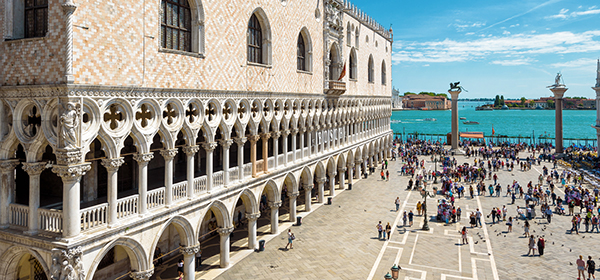Cost of Living in Venice
Summary: Understanding the the cost of living in Venice helps a newcomer what to expect when it comes to apartment or house hunting, grocery shopping, transportation, dining out, utilities and more.

| Category | Cost |
|---|---|
| Apartment Rentals | A one-bedroom apartment in the city center of Venice typically costs between €800 and €1,200 per month. Outside the city center, the cost drops to around €600 to €900 per month. |
| Apartment Purchases | The price to buy an apartment in the city center of Venice can range from €6,000 to €10,000 per square meter. Outside the city center, the price drops to around €3,000 to €5,000 per square meter. |
| Transportation | A monthly public transportation pass in Venice costs around €37. A one-way ticket costs €1.50. Taxis start at €7 with an additional €1.10 per kilometer. Gasoline costs approximately €1.60 per liter. |
| Groceries | The cost of groceries in Venice can vary, but on average, you can expect to spend around €300 to €400 per month. A liter of milk costs around €1.10, a loaf of bread costs around €1.50, and a dozen eggs cost around €3.00. |
| Restaurants | A meal at an inexpensive restaurant in Venice costs around €15. A three-course meal for two people at a mid-range restaurant costs around €70. A cappuccino in a café costs around €1.50. |
| Utilities | Basic utilities for an 85m2 apartment, including electricity, heating, cooling, water, and garbage, cost around €150 per month. Internet costs around €30 per month. |
| Private School Tuition | Private school tuition in Venice can vary greatly depending on the school. On average, you can expect to pay around €5,000 to €10,000 per year for preschool, €8,000 to €15,000 per year for elementary school, and €10,000 to €20,000 per year for middle and high school. |
Monthly Budget for Retirees in Venice
"Living in Venice, is generally considered to be quite expensive. The cost of housing is high, especially in the more desirable areas of the city. Renting a one-bedroom apartment in the city center can be quite costly, while outside the city center, it can be somewhat less expensive. The cost of groceries and dining out is also high in Venice. A meal at an inexpensive restaurant can be pricey, and a three-course meal for two at a mid-range restaurant can be even more expensive. Groceries are also more expensive than in many other parts of Italy, with basic items such as bread, milk, and eggs costing more than average.Transportation costs can also add up, especially if you frequently use the city's iconic gondolas or water taxis. Public transportation, such as the vaporetto (water bus), is less expensive but still costs more than public transportation in many other cities. Utilities, including electricity, heating, cooling, water, and garbage, are also quite expensive in Venice. Internet and mobile services are comparatively cheaper but still higher than in many other European cities.Overall, the cost of living in Venice is high compared to many other cities in Italy and Europe. Despite this, many people are drawn to the city's unique charm, rich history, and vibrant culture," said one expat living in Venice.
Can I live in Venice on $1,500 a month?
"I've been living in Venice for a few years now and I can tell you that living on $1,500 a month is possible, but it will require some sacrifices and smart budgeting. Venice is a beautiful city, but it's also a tourist hotspot, which means that the cost of living can be quite high, especially in the more popular areas. Firstly, you'll need to find affordable accommodation. The neighborhoods of Cannaregio and Castello are more residential and less touristy, so you can find cheaper rents there. A small apartment can cost you around $700-$800 a month. However, avoid areas like San Marco and Dorsoduro, they are very popular with tourists and the rents are significantly higher.Next, you'll need to consider your food budget. Eating out in Venice can be expensive, especially in the tourist areas. I've found that cooking at home and shopping at local markets like Rialto Market can save you a lot of money. You can get fresh produce, fish, and local products at a reasonable price. Transportation is another cost to consider. The vaporettos, or water buses, are the main form of public transportation in Venice. A monthly pass costs around $40. However, walking is also a great way to get around and it's free!Lastly, you'll need to budget for utilities and other expenses. Utilities can cost around $150-$200 a month, depending on the season. Internet and mobile plans are relatively cheap, around $30-$40 a month. So, if you budget carefully, you can live on $1,500 a month in Venice. However, you'll need to make some sacrifices. You won't be able to eat out often, you'll need to live in a smaller apartment in a less central area, and you'll need to be careful with your spending. But in return, you'll get to live in one of the most beautiful cities in the world," commented an expat living in Venice.
Can I live in Venice on $3,500 a month?
"I've been living in Venice for a few years now and I can tell you that living on $3,000 a month is possible, but it does require some careful budgeting and lifestyle adjustments. Venice is a beautiful city, but it's also a tourist hotspot, which means that the cost of living can be quite high, especially in the more popular areas. For instance, neighborhoods like San Marco and Dorsoduro are stunning, but the rents and cost of living there can be quite steep. If you're looking to save money, I'd recommend looking at neighborhoods like Cannaregio or Castello. They're a bit more residential, but still have plenty of charm and are more affordable. In terms of lifestyle adjustments, dining out can be quite expensive in Venice, especially in the touristy areas. I've found that cooking at home and shopping at local markets can save a lot of money. The Rialto Market, for example, has a great selection of fresh produce, fish, and meats at reasonable prices. Transportation is another area where you can save. Venice is a compact city and it's easy to get around on foot. The vaporettos (water buses) are a bit pricey, so I usually reserve them for longer trips. As for modern amenities, most apartments in Venice are equipped with the basics, but don't expect ultra-modern facilities unless you're willing to pay a premium. Many buildings in Venice are centuries old and while they have been updated with modern conveniences, they may not have all the latest amenities you're used to. Lastly, keep in mind that Venice is prone to flooding, especially in the fall and winter. This can lead to additional expenses, like waterproofing your home or repairing water damage. All in all, living in Venice on $3,000 a month is doable, but it does require some sacrifices and careful budgeting. But in my opinion, the beauty and charm of the city make it all worth it," said one expat living in Venice.
Can I live in Venice on $5,000 a month?
"I've been living in Venice for a few years now and I can tell you that living on $5,000 a month is definitely possible, but it does require some careful budgeting and planning. Venice is a beautiful city, but it's also a tourist hotspot, which means that prices can be quite high, especially in the more popular areas. If you're used to modern amenities, you'll find that most apartments in Venice are equipped with everything you need, but the cost can vary greatly depending on the location. The most expensive neighborhoods are San Marco and Dorsoduro. These are the heart of Venice, where you'll find most of the tourist attractions, high-end restaurants, and luxury shops. Renting an apartment here can cost you upwards of $2,000 a month, and that's for a small one-bedroom. If you want to live in these areas, you'll have to be prepared to cut back on other expenses.On the other hand, there are more affordable neighborhoods like Cannaregio and Castello. These areas are a bit further from the city center, but they're still within walking distance of most attractions. Plus, they offer a more authentic Venetian experience, with local markets, traditional restaurants, and fewer tourists. You can find a decent apartment in these areas for around $1,000 to $1,500 a month.As for other expenses, groceries can be quite expensive in Venice, especially if you shop at the supermarkets in the city center. However, if you go to the local markets in Cannaregio or Castello, you can find fresh produce, meat, and fish at much lower prices. Eating out can also be pricey, but there are plenty of affordable trattorias and pizzerias if you know where to look.Transportation is another cost to consider. The vaporettos (water buses) are the main form of public transportation in Venice, and a monthly pass costs around $70. However, if you live in a central location and don't mind walking, you can save a lot on transportation costs.So, to sum up, living in Venice on $5,000 a month is doable, but you'll have to be smart about your spending. Choose an affordable neighborhood, shop at local markets, eat at budget-friendly restaurants, and try to walk as much as possible. If you can do that, you'll be able to enjoy all the beauty and charm that Venice has to offer without breaking the bank," commented an expat living in Venice.
About the Author
 Betsy Burlingame is the Founder and President of Expat Exchange and is one of the Founders of Digital Nomad Exchange. She launched Expat Exchange in 1997 as her Master's thesis project at NYU. Prior to Expat Exchange, Betsy worked at AT&T in International
and Mass Market Marketing. She graduated from Ohio Wesleyan University
with a BA in International Business and German.
Betsy Burlingame is the Founder and President of Expat Exchange and is one of the Founders of Digital Nomad Exchange. She launched Expat Exchange in 1997 as her Master's thesis project at NYU. Prior to Expat Exchange, Betsy worked at AT&T in International
and Mass Market Marketing. She graduated from Ohio Wesleyan University
with a BA in International Business and German.
Some of Betsy's articles include 12 Best Places to Live in Portugal, 7 Best Places to Live in Panama and 12 Things to Know Before Moving to the Dominican Republic. Betsy loves to travel and spend time with her family. Connect with Betsy on LinkedIn.
Additional Information:
- Retire in Venice Guide
- 7 Tips for Living in Venice
- Pros & Cons of Living in Venice
- Driving in Venice
- Health Care in Venice
- The Insider's Guide to Venice
- Cost of Living in Venice
- Healthcare & Health Insurance in Italy
- Best Places to Live in Italy
- Real Estate in Italy
- Best Places to Visit in Italy for Christmas Cheer
- Pros and Cons of Living in Italy 2025
- 2025 Guide to Moving to Italy
- More Advice about Retiring in Italy



